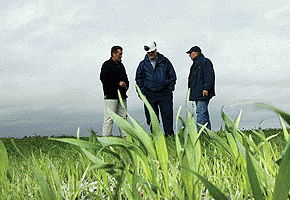
By Allan Barber
 The KPMG Agribusiness Agenda 2012, released this week, contains interesting observations which have been gathered from conversations with nearly 100 business leaders.
The KPMG Agribusiness Agenda 2012, released this week, contains interesting observations which have been gathered from conversations with nearly 100 business leaders.
But like most strategy documents I have ever read, the conclusions never quite seem to live up to the anticipation.
However this is a solid document with good ideas.
The report is sub-titled ‘People unlocking the future’ which is a truism, but the main point is the need for people in agribusiness to work together to articulate the message about the potential of agriculture and to attract talent to enter the sector.
The leaders canvassed agree that there needs to be a pan-industry vision and strategy to unlock this potential.
New Zealand has rediscovered agriculture as an industry with enormous potential to provide food for the world’s population when only 25 years ago it was regarded, at least by politicians, as a sunset industry.
However we are too small to have any chance of meeting the needs of more than a small fraction of this global population, so we need to focus on where New Zealand can get the best return.
According to the Agenda (6.3 MB .pdf) we have a choice between supplying commodity products to lower paying customers or higher value products to premium markets. But to take the second path requires clarity of vision and the combined inputs of talented people.
Report author, Ian Proudfoot, who is head of KPMG’s Agribusiness New Zealand and Asia Pacific says people across the sector need to start developing a common view of what success will look like. This will then lead to conversations about collaboration between companies, industry good organisations and government to get there. There is a continuum from vision and strategy through collaboration and focused innovation which will lead to growth in wealth for individuals, industry and the country as a whole.
It sounds easy when stated simply and quickly, but this goal has proved to be extremely elusive and won’t easily be achieved.
Following a review of what has happened during the last 12 months the report leads off with a set of, at first sight, fairly underwhelming recommendations, although each is worthy in its own right: rural broadband acceleration, increase in irrigation, long term sustainability of bee population, getting students to pursue relevant vocational courses of study, consistent foreign investment rules and certainty of sustainability standards underpinning New Zealand’s primary products’ natural reputation.
These can be regarded as essential preconditions for the development and achievement of a successful strategy.
The response of the agribusiness leaders listing their main issues show the clearly perceived importance of maintaining a world class biosecurity system and New Zealand’s clean, green image, followed by a wish for collaboration between all parts of the value chain, irrigation and water storage, and the urgent introduction of rural broadband.
Strangely, investment in R & D and improving mechanisms for the uptake of innovation had declined in importance from last year. At the bottom of the wish list came the issues of Foreign Direct Investment and trials of genetically modified cultivars, presumed to be because these were perceived as too hard to be able to influence.
The report also takes a look into the future by proposing a series of scenarios which could or should have occurred by 2030 – including a New Zealand umbrella brand covering 95% of all exports, Fonterra establishing dairy farming JVs in Ukraine and Zimbabwe, eight meat companies collaborating to establish three slaughter units nationally, a large increase in agricultural graduates, New Zealand’s food safety coalition winning a massive contract in India and 20 companies with annual turnover of over $1 billion.
These scenarios and a number of others were all raised by the agribusiness leaders in their conversations with KPMG.
The big question is how to achieve the changes necessary to enable these scenarios to be realised. The report recommends that industry and government work together to develop a national primary industry strategy which defines the vision and actions required to implement it.
But an examination of the present state of collaboration and the success of outcomes says the present situation is ‘fairly dire’, because either individuals find it hard to leave parochialism behind or schemes are launched with a big bang, only to fizzle out when it proves too hard to satisfy all parties.
There are plenty of smaller examples of collaboration within single sectors, notably the Red Meat Sector Strategy, the Silver Fern Farms led PGP partnership project and Beef & Lamb New Zealand’s PGP project with four meat companies which SFF has also decided to join. This indicates a desire to put collective endeavour ahead of individual company ambitions.
KPMG’s agenda concludes that the attitude of agribusiness leaders has changed significantly since last year with over 80% now believing in the benefit of working together to create a pan-industry strategy. The risk is that senior executives will become embroiled in the detail of their own sector or company before this positive attitude can be translated into action.
As KPMG is obviously looking for business in the agribusiness space, I suspect it will have to invest some more pro bono time to pull key players together and get the programme started. Otherwise next year’s Agenda will have little progress to report.
--------------------------------------------
Allan Barber is a commentator on agribusiness, especially the meat industry, and lives in the Matakana Wine Country where he run a boutique B&B with his wife. You can contact him by email at allan@barberstrategic.co.nz or through his blog at http://allan.barber.wordpress.com.

We welcome your comments below. If you are not already registered, please register to comment
Remember we welcome robust, respectful and insightful debate. We don't welcome abusive or defamatory comments and will de-register those repeatedly making such comments. Our current comment policy is here.